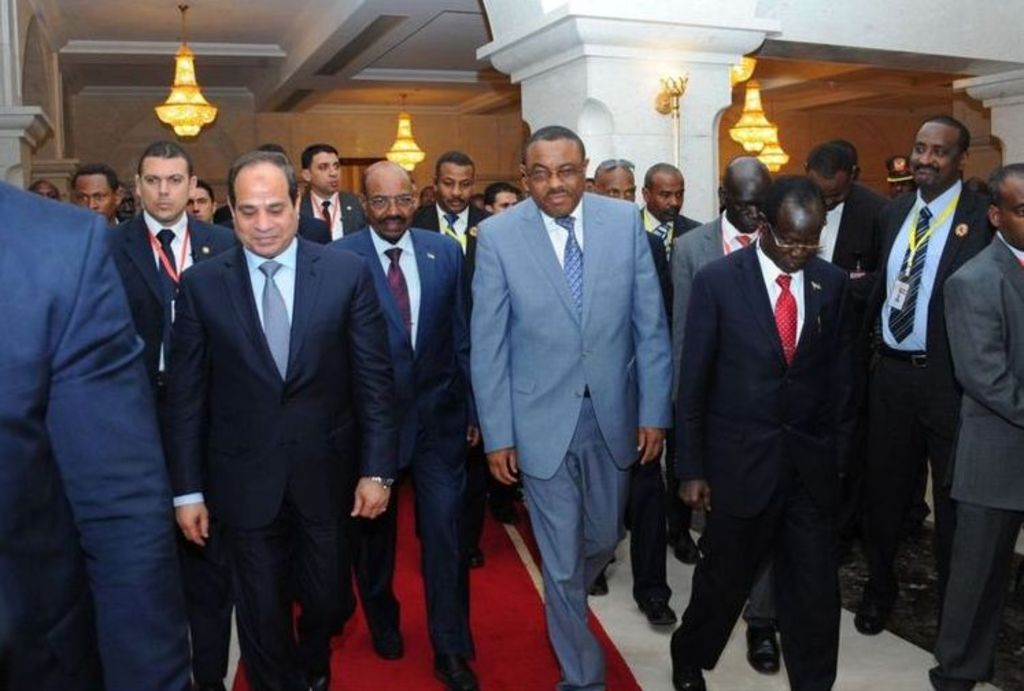
The Halayeb triangle is located on the border between south-eastern Egypt and north-eastern Sudan. Rich in gold and manganese, the small strip of desert has historically been inhabited by competing tribes. Shortly after Sudan gained independence in 1956, it challenged Egypt’s sovereign claim to the region.
However, the dispute goes back more than a century. In 1899, the British Empire demarcated the borders between the countries. The 22nd parallel was the dividing line.
The Halayeb triangle fell just within the borders of modern-day Egypt. Three years later, the interior minister granted Khartoum the authority to govern the inhabitants of the region. His explanation was that the tribes shared stronger cultural and ethnic ties with the people of Sudan.
Sudan’s president, Omar al-Bashir, has cited the 1902 agreement to pressure Egypt into handing over the Halayeb triangle. Egypt has not budged, however, and insists that the 1899 consensus was never annulled.
The Halayeb triangle suffers from a severe lack of human resources. Egyptian doctors and teachers are reluctant to work there due to its proximity to the Sudanese border, harsh weather conditions and distance from the capital.
Since 1995, the Egyptian military has also had a presence in the area. Troops were deployed after former dictator Hosni Mubarak escaped an assassination attempt during his visit to Ethiopia. Egypt accused al-Bashir of masterminding the attack.
Tensions over the disputed territory have escalated in recent months. Al-Bashir has said repeatedly that the Halayeb triangle is part of Sudan, although he has assured his people that he will not go to war over the issue. He has instead requested that Egyptian President Abdel Fattah al-Sisi engage in direct negotiations. Al-Bashir has also threatened to resort to the United Nations Security Council (UNSC) to resolve the dispute.
In March 2017, Sudan’s Foreign Ministry drew up a controversial plan to evict Egyptians from the Halayeb triangle. Egyptian media promptly responded by launching a robust propaganda campaign against Sudan.
To de-escalate tensions, al-Sisi agreed to hold diplomatic talks. Yet so far, nothing has been resolved. Egypt refuses international arbitration and al-Bashir accuses Egypt of supporting opposition rebels in his country. In April 2017, Sudan imposed entry restrictions on Egyptian men between the age of 19 and 49. Egyptians previously enjoyed visa-free entry to Sudan.
Sudan, meanwhile, has gained increased international leverage. A Sudanese official told The New Arab that Saudi Arabia is supportive of Sudan’s cause. This is not surprising, following improved bilateral relations between the two countries in recent years. Sudan has also cut ties with Iran, Saudi Arabia’s arch-enemy, and sent thousands of troops to fight on behalf of the Saudis in Yemen, in return for $5 billion in military aid.
Furthermore, al-Bashir has built stronger relations with the United States – a permanent member of the UNSC – after distancing itself from groups that the US State Department classifies as terrorist organizations.
Egyptian journalist Maged Atef argues that Sudan’s improved relations with powerful states has emboldened it to reopen the land dispute. Egypt has tried to make concessions while still maintaining sovereign control over the Halayeb triangle. An Egyptian government official reportedly said in early June 2017 that Sudan had rejected an offer to enforce the Four Freedoms Agreement, which both countries signed in 2004.
That agreement would have given citizens from both countries the freedom to travel, work, live and purchase property in the disputed territory.
Nile River Waters
The territorial dispute is not the only issue that has strained diplomatic relations. For years, Ethiopia has been preparing to build a dam on the Nile that will generate 6,000 megawatts of electricity, more than double the amount it currently produces. Yet the benefits for Ethiopia come with a potential cost for Egypt.
Unlike most countries situated along the Nile, Egypt depends on the river for more than 80 per cent of its water needs. Thanks to the 1929 Anglo-Egyptian Treaty – signed during British colonial rule – Egypt has had a monopoly over the Nile waters. The bilateral Nile Agreement between Sudan and Egypt in 1959 reinforced, albeit with some modifications, the colonial treaty from 30 years earlier.
Egypt has since enjoyed access to two thirds of the Nile waters, although these are no longer enough to sustain the country’s exploding population and agricultural sector.
Yet with many African nations demanding a fairer share of the water, al-Sisi was cornered into signing a new agreement two years ago with Ethiopia and Sudan. The deal implicitly permitted the building of the dam, as long as it did not result in any considerable harm to Egypt or Sudan. Two French firms were then invited to study the impact of the project.
However, Mwangi S. Kimenvi and John Mukum Mbaku from the Brookings Institute argue that the new agreement does not resolve the larger dispute over the allocation of the Nile waters.
Worse still, Egypt’s agreement with Ethiopia is looking fragile. While Sudan initially opposed the dam, it now fully supports the project. This is because the dam will supply Sudan with energy it desperately needs. It will also help prevent flooding while increasing agricultural input.
Sudan and Ethiopia are on high alert for an Egyptian offensive. In May 2017, both country’s armies were placed on standby. Their concerns are not unfounded. Egypt has already sought permission to establish a naval base in Eritrea, which once waged a brutal two-year war against Ethiopia. This development has aroused deep suspicion among Ethiopian and Sudanese officials.
Journalist Amna Bagadi wrote in 2014 that diplomatic relations between Sudan and Egypt were increasingly ambivalent. She suggested that al-Bashir and al-Sisi were trying to exploit each other’s weaknesses to achieve their political ends. The dubious tactics that both leaders employ, she argued, make them more similar than they might like to admit. Recent events seem to be proving her right.


